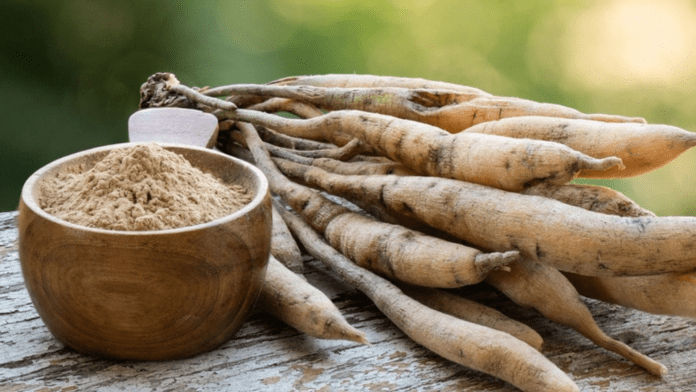Women’s health is a multifaceted and complex topic that encompasses various physical, emotional, and hormonal aspects. Throughout history, different cultures have sought natural remedies to address women’s health concerns effectively. One such time-honored solution is shatavari, a traditional herb that has been revered in Ayurvedic medicine for centuries. This article explores the powerful properties of shatavari and its ability to promote hormonal balance and radiant skin, making it a transformative remedy for women’s health.
Understanding Shatavari:
Shatavari, botanically known as Asparagus racemosus, is a perennial climbing herb native to the Indian subcontinent. It belongs to the asparagus family and has been an integral part of Ayurvedic medicine, where it is considered a “Rasayana” or rejuvenating herb. The name “Shatavari” is derived from Sanskrit words “shat,” meaning “hundred,” and “vari,” meaning “roots.” These roots are the primary part used in various medicinal preparations.
Nutritional Composition:
Shatavari is rich in essential nutrients, including vitamins (A, B1, B2, C, and E), minerals (calcium, magnesium, and zinc), and dietary fibers. Additionally, it contains steroidal saponins, alkaloids, flavonoids, and glycosides that contribute to its medicinal properties.
Traditional Uses:
Ayurvedic practitioners have utilized shatavari for its numerous health benefits, focusing particularly on women’s well-being. Its traditional uses include promoting fertility, enhancing lactation, improving digestion, supporting the female reproductive system, and alleviating menstrual problems and menopausal symptoms.
Shatavari and Hormonal Balance
- Regulating Estrogen Levels:
Hormonal imbalances, especially fluctuations in estrogen levels, can lead to various health issues in women. Shatavari contains phytoestrogens, plant compounds that mimic estrogen’s action in the body. These phytoestrogens can help balance hormone levels, especially during menstruation, menopause, or other phases of reproductive life.
- Menstrual Health:
Menstrual irregularities and discomfort are common issues women face. Shatavari’s adaptogenic properties can support the body’s stress response and help ease premenstrual syndrome (PMS) symptoms, such as bloating, mood swings, and breast tenderness. Its anti-inflammatory effects may also alleviate menstrual pain.
- Menopause Relief:
As women transition through menopause, hormonal changes can bring various challenges, including hot flashes, night sweats, and mood disturbances. Shatavari’s hormone-balancing properties can provide relief from menopausal symptoms and improve overall well-being during this transformative phase of life.
- Fertility Support:
Infertility is a distressing concern for many women. Shatavari’s ability to regulate hormonal imbalances, enhance reproductive health, and support the menstrual cycle may improve fertility in some cases. However, it is essential to consult a healthcare professional for personalized guidance and treatment.
Skin Benefits of Shatavari:
- Antioxidant and Anti-inflammatory Effects:
The skin is constantly exposed to environmental pollutants and UV radiation, leading to oxidative stress and inflammation. Shatavari’s rich antioxidant content helps neutralize free radicals, protecting the skin from premature aging and damage caused by oxidative stress.
- Collagen Production:
Collagen is a vital protein that maintains the skin’s elasticity and youthful appearance. Shatavari’s nutrients, including vitamin C and zinc, contribute to collagen synthesis, promoting skin firmness and reducing the appearance of wrinkles and fine lines.
- Hydration and Moisture Retention:
Proper hydration is essential for healthy skin. Shatavari’s natural moisturizing properties help maintain optimal skin hydration levels, preventing dryness and promoting a radiant complexion.
- Soothing and Calming Effects:
Shatavari possesses anti-inflammatory properties that can help soothe and calm irritated or sensitive skin. It may alleviate skin conditions like acne, eczema, and dermatitis, providing relief and promoting overall skin health.
Incorporating Shatavari into Daily Routine
- Shatavari Supplements:
Shatavari is available in various forms, including capsules, tablets, powders, and liquid extracts. When choosing a supplement, it is crucial to select high-quality products from reputable sources and follow the recommended dosage.
- Culinary Uses:
Shatavari can also be consumed as a culinary ingredient. It is used in traditional recipes, beverages, and herbal teas. Incorporating shatavari into the diet allows for a holistic approach to harness its health benefits.
- External Application:
Shatavari-infused oils or creams can be topically applied to the skin for enhanced skincare benefits. These formulations may help address specific skin concerns and improve overall skin health and radiance.
Precautions and Considerations:
- While shatavari is generally well-tolerated, it is essential to exercise caution and consider certain factors:
- Pregnant or breastfeeding women should consult their healthcare provider before using shatavari.
- Individuals with certain medical conditions or taking specific medications should seek medical advice before incorporating shatavari into their routine.
- It is advisable to follow the recommended dosage and not exceed the suggested limits.
- Quality and authenticity of shatavari products should be ensured by purchasing from reliable sources.
Final Thoughts:
Shatavari, a revered herb in Ayurvedic medicine, offers transformative benefits for women’s health. Its ability to promote hormonal balance and enhance skin health makes it a valuable natural remedy. From regulating estrogen levels and supporting menstrual health to improving skin radiance and vitality, shatavari provides a holistic approach to women’s well-being. However, it is crucial to consult healthcare professionals and follow recommended guidelines to optimize the benefits of shatavari and ensure safe usage. By incorporating this time-honored herb into daily routines, women can experience the transformative power of shatavari in their lives.





